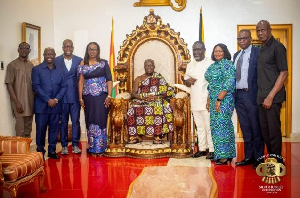- Home - News
- TWI News | TV
- Polls
- Year In Review
- News Archive
- Crime & Punishment
- Politics
- Regional
- Editorial
- Health
- Ghanaians Abroad
- Tabloid
- Africa
- Religion
- Election 2020
- Coronavirus
- News Videos | TV
- Photo Archives
- News Headlines
- Press Release
Business News of Wednesday, 28 August 2013
Source: Daily Guide
Ghana-EU timber agreement still inactive
An agreement between Ghana and the European Union to trade in legal timber is yet to be implemented four years after it was signed by the two parties. The Voluntary Partnership Agreement (VPA) on Forest Law Enforcement, Governance and Trade in Timber Products was signed in November 2009 and was expected to have been effected two years after.
According to Chris Beeko, Director of the Timber Validation Department of the Forestry Commission, who interacted with journalists in Accra at a programme organized by the Working Group on Forest Certification, said Ghana was the first country to sign the VPA but the necessary systems were yet to be fully put in place.
He explained that in line with the agreement, Ghana was expected to have put in place systems such as the development of a legality assurance scheme, wood tracking system, verification protocols for assessing legal compliance and recruitment of an independent monitor and the establishment of a Timber Validation Committee.
He stated that the development of the legality assurance systems was “currently in its final stages,” adding that “we expect that it would be ready by next year so “we can start issuing licences for the trading in legally sourced timber.”
Mr Beeko stated that the international market for timber had changed considerably over the last decade towards responsible purchasing and that the VPA was expected to provide opportunities for the production of legal timer and help curb the activities of chain saw operators who deplete the forest.
It would also provide opportunity to operators in Ghana’s timber industry to secure existing markets in the EU which until recently was the largest market for timber from Ghana and develop new markets. As at the time of signing the VPA, the EU handled 60 percent of timber from Ghana in terms of value and volume but this had so far dropped to 20 per cent.
The agreement came into force after European consumers raised concerns over the legal origin of imported timber to their markets.
The EU, in tackling illegal logging, developed the Forest Law Enforcement, Governance and Trade Action Plan in 2003, and has been signing bilateral agreements with timber producer countries with the aim of improving forest governance and ensuring that wood imported into the EU meet legal requirements of the country where the lumber is sourced.
Locally, he said the VPA would help Ghana develop and regulate the domestic market; structure and make industry more completive in the sub-region as well as contribute to the achievement of sustainable forest management.
Legal timber is sourced from the prescribed source with the consent of the owner. Also at the time of felling, the logger should hold a valid timber utilization licence issued by the Minister for Lands, Forests and Mines, ratified by Parliament following the prescribed competitive process.
Anyone who fells a tree must be granted replacement for timber rights.










